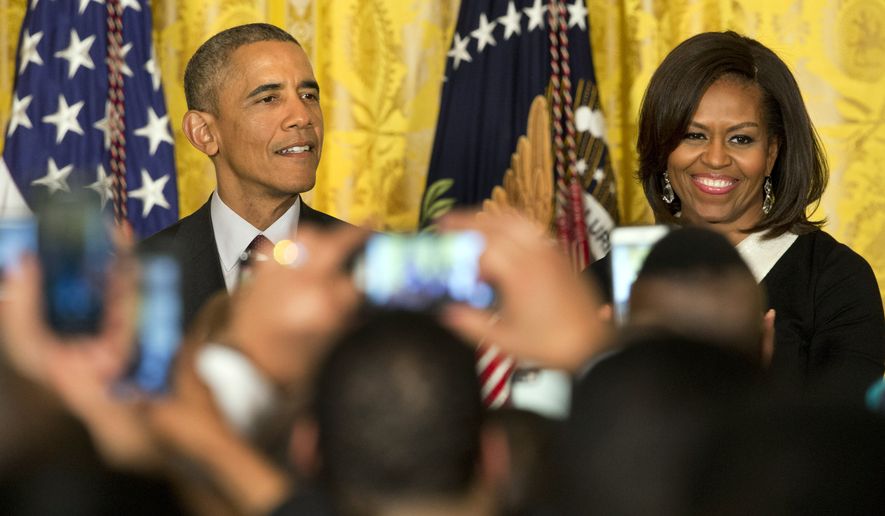ANALYSIS/OPINION:
Imagine if the president were a Republican, and if during the second half of his second term, after having been elected both times with record turnout by blacks, the black unemployment rate remained stagnant at 11 percent while the black poverty rate hit a record high of 27 percent. What would black politicians be saying about that Republican president?
We don’t really need to answer that question, do we? But for argument’s sake, let’s imagine that almost seven years after the Great Recession the country was basically back to work, with an official unemployment rate haven fallen from almost 10 percent at its height to around 5.5 percent (let’s save the argument about the real rate for another day). Meanwhile, the black community, which had overwhelmingly supported the Republican president (again let’s suspend disbelief for a moment) was experiencing rising poverty rates.
Furthermore, imagine if under a Republican president there had been a virtual epidemic of incidents of police brutality in predominantly black neighborhoods. And imagine if New York were paying out record civil settlements over police brutality claims but not one police officer had been brought to trial in any of the incidents. Furthermore, despite a bunch of official hoopla, the federal government had not stepped in and brought civil rights lawsuits. What do you think the reaction of so-called black leaders would be?
Let’s take this a bit further. Let’s say that black unemployment were highest in the cities with the most conservative Republican mayors, cities like Detroit, Chicago and Cleveland (stay with me here). What if in Chicago, the president’s hometown, his right-hand man had carpetbagged his way to a mayoral win mostly on the backs of the black supporters of the president? And in that town, under the president’s hand-picked mayor, the black homicide rate were to spiral to almost genocidal proportions. How do you think the black leadership would respond to such a situation?
These rhetorical questions are worth asking because under a Republican administration the implications of such a dire record of addressing the needs of blacks would be unsettling to say the least. In all likelihood, there would be marching in the street, with Al Sharpton and Jesse Jackson and the like talking about how this administration was the worst for blacks since before the civil rights era. And of course they’d be right.
According to a scholarly paper published in March 2014 by University of San Diego political science professors Zoltan Hajnal and Jeremy Horowitz titled “Racial Winners and Losers in American Party Politics,” over the past 50 years blacks have fared significantly better under Democratic administrations than Republican ones.
That trend has not held under the Obama administration. In all three measures covered under the study — poverty, income and unemployment — blacks have fared worse under the Obama administration than under the previous administration. Yet the rallying cry of Democrats has been fearmongering, essentially arguing that Republicans will deny blacks the right to vote and rescind social welfare programs popularized since the civil rights era. The fact remains, however, that the Obama administration has failed miserably at preserving civil-rights-era legislation (for the first time in 50 years sections of the voting rights act were struck down), and miserable at preserving black wealth and economic opportunities.
We are finally at a point in this country where the civil-rights-era politics have worn too thin to serve as a freedom suit. They are not as relevant to today’s political realities. No one is talking about taking away anyone’s vote or instituting a system of de jure segregation.
Yet in practice, blacks have found themselves isolated and gerrymandered on the local level — ultimately unable to build coalitions to advocate for broad-based change within the Democratic Party ghetto. Furthermore, blacks are starting to fall behind economically — and not just at the lower levels of the socioeconomic spectrum. Even black college graduates have fallen prey to intractable unemployment in a rapidly changing economic climate for all Americans.
The point here is that the price of identity politics may have proved too high. That is, by overcommitting to the Obama administration, the black leadership may have failed to strengthen and develop relationships in the business and corporate community that generally have considered Mr. Obama’s economic policies inimical to growth.
Then there is the cost of the Obama presidency itself. Mr. Obama has generally gone out his way to seem race-neutral with respect to black issues in a way that no prior president would ever have to. He has not spoken out forcefully against systemic factors that have kept blacks mired in poverty and unemployment — specifically the system of local governments funding themselves by overfining and criminalizing citizens for minor infractions. The Justice Department’s report on the police and court system in Ferguson, Missouri, provides a scathing condemnation of these practices, but it’s worth noting that these draconian practices have taken hold in states such as California that have liberal Obama supporters in the governor’s mansions.
With friends like Mr. Obama, who needs enemies? His administration has provided cover for some of the worst civil rights abuses in recent history, and failed miserably to stem the downward spiral or black unemployment and wealth destruction. It is really time to ask whether the price blacks paid for symbolic representation may have been too high.
• Armstrong Williams is sole owner/manager of Howard Stirk Holdings and executive editor of American CurrentSee online magazine.
• Armstrong Williams can be reached at 125939@example.com.




Please read our comment policy before commenting.